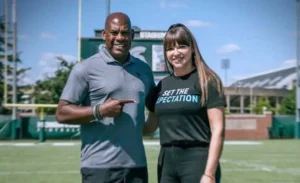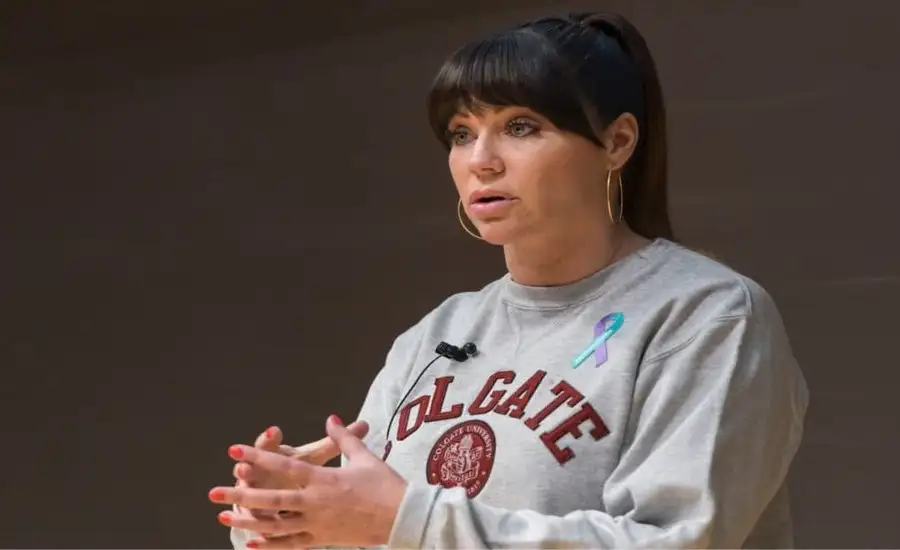Brenda Tracy stands as a powerful advocate in the fight against sexual violence, particularly within the realm of college sports. Her mission began with a deeply personal and painful experience, which she has since transformed into a national movement. Tracy’s story, her unwavering commitment, and her impact on policies and attitudes across the United States offer a beacon of hope for survivors and a call to action for everyone.
Early Life and the Incident that Changed Everything
Brenda Tracy grew up in Oregon, where she developed a passion for helping others. She pursued a career in nursing, a field that allowed her to care for and support people in their times of need. However, her life took a tragic turn in 1998 when four men, including two Oregon State University football players, brutally raped her. Despite overwhelming evidence, including Tracy’s testimony and physical evidence, the authorities did not prosecute the case. The university imposed a mere one-game suspension on the athletes, and the other perpetrators walked free.
This injustice left Tracy devastated and silenced for many years. However, she found the strength to speak out publicly in 2014, sharing her story with the world. Her decision to break her silence marked the beginning of her journey as an advocate, determined to prevent others from experiencing the same pain and betrayal.
The Birth of a Movement
As soon as Brenda Tracy began sharing her story, she quickly realized the importance of using her voice to advocate for change. Tracy initially focused on raising awareness about sexual violence, particularly in the context of college sports. Her story resonated deeply with many, and she received an outpouring of support. At the same time, she also faced significant backlash from those who wanted to silence her.
A bio table that summarizes key aspects of Brenda Tracy’s life and work:
| Attribute | Details |
|---|---|
| Name | Brenda Tracy |
| Birthplace | Oregon, USA |
| Profession | Advocate, Public Speaker, Survivor |
| Known For | “Set the Expectation” campaign, Advocacy against sexual violence |
| Major Incident | Survived a gang rape in 1998 involving Oregon State University football players |
| Campaign | Set the Expectation |
| Focus Areas | Sexual violence prevention, Support for survivors, College sports reform |
| Key Partnerships | National Sexual Violence Resource Center (NSVRC), RAINN |
| Legislative Impact | Influenced laws on sexual assault reporting and survivor support |
| Public Speaking | Frequently speaks at universities, conferences, and sports organizations |
| Social Media | Active on Twitter and Instagram, engaging in advocacy and education |
| Challenges | Faced resistance, threats, and attempts to discredit her work |
| Legacy | A national figure in sexual violence prevention, ongoing influence in policy |
| Future Goals | Expand advocacy, inspire new advocates, push for stronger sexual violence prevention policies |
| Personal Traits | Resilient, Courageous, Unwavering in commitment to justice |
Nevertheless, Tracy remained undeterred. She knew that the only way to effect real change was to speak out, educate others, and push for reforms. Therefore, she launched her “Set the Expectation” campaign in 2016. This initiative encourages athletic programs, coaches, and student-athletes to take a stand against sexual violence and support survivors. Tracy’s campaign includes a pledge that individuals and teams can sign, committing to upholding a standard of respect, integrity, and accountability.

Net Worth
Estimating Brenda Tracy’s net worth is challenging due to the nature of her work, which is focused on advocacy and public speaking rather than commercial ventures. Typically, activists and public speakers like Tracy earn income through speaking engagements, partnerships with organizations, and potentially some consulting or educational work. Based on industry standards, public speakers can earn anywhere from $5,000 to $20,000 per speaking engagement, depending on the event and their prominence. Given Tracy’s national recognition and the impact of her work, it is plausible that she could command fees on the higher end of this range. Additionally, any income from partnerships or consulting might contribute to her financial standing. However, considering her primary focus is on advocacy rather than profit, her estimated net worth likely reflects a modest lifestyle centered around her mission rather than significant financial accumulation, potentially ranging in the low to mid six figures.
Building Alliances and Expanding Influence
Tracy recognized that to create a lasting impact, she needed to collaborate with others who shared her vision. Consequently, she began working with college coaches, athletic directors, and administrators to implement policies and training programs that address sexual violence. Tracy’s work often involves speaking directly to athletes, many of whom have been moved by her story and motivated to become advocates themselves.
Moreover, Tracy has partnered with several organizations that focus on preventing sexual violence and supporting survivors. Through these collaborations, she has expanded the reach of her message and provided resources to those in need. For example, Tracy has worked with the National Sexual Violence Resource Center (NSVRC) and the Rape, Abuse & Incest National Network (RAINN) to promote education and prevention efforts nationwide.
In addition to her work with established organizations, Tracy has also built relationships with legislators and policymakers. She advocates for laws that protect survivors and hold perpetrators accountable. Her testimony has influenced the passage of several bills, including legislation that addresses how colleges handle sexual assault cases.
The Power of Education and Awareness
One of Tracy’s key strategies in combating sexual violence involves education. She understands that changing attitudes and behaviors requires more than just punitive measures; it demands a cultural shift. Consequently, Tracy emphasizes the importance of educating young people about consent, respect, and healthy relationships.
Tracy frequently visits college campuses, where she shares her
personal story and leads discussions on sexual violence prevention. These visits often leave a profound impact on the student-athletes she meets. Many of them, especially young men, express that Tracy’s words challenge them to rethink their understanding of masculinity, respect, and responsibility. These conversations are crucial, as they plant the seeds for a more informed and compassionate generation.
Additionally, Tracy’s approach includes training sessions for coaches and administrators. She believes that leaders in college sports play a pivotal role in shaping the culture of their teams. Therefore, it is essential that they lead by example, demonstrate zero tolerance for sexual violence, and actively support survivors. Tracy’s workshops often include practical advice on how to handle disclosures of sexual assault, how to support survivors, and how to create an environment where everyone feels safe and respected.
To further spread her message, Tracy has utilized social media and public speaking engagements. Her presence on platforms like Twitter and Instagram allows her to engage with a broader audience, share resources, and keep the conversation going. Tracy also frequently speaks at conferences, summits, and other events focused on violence prevention and advocacy. Through these channels, she reaches thousands of people who might not have otherwise been exposed to her message.
Overcoming Challenges and Continuing the Fight
Despite the significant progress Brenda Tracy has made, her journey has not been without challenges. Throughout her advocacy, she has faced threats, harassment, and attempts to discredit her. Some critics argue that her efforts unfairly target athletes and undermine due process. Tracy, however, consistently emphasizes that her mission is not to vilify anyone but rather to hold people accountable and create safer environments for everyone.
Moreover, Tracy encounters resistance from institutions reluctant to change long-standing practices. Many colleges and universities struggle with implementing effective policies on sexual violence, often due to a lack of resources or a desire to protect their reputations. Tracy’s work frequently involves pushing these institutions to prioritize the well-being of their students over their public image.
Nevertheless, Tracy remains resolute. She believes deeply in her cause and understands that real change takes time and persistence. Tracy often draws strength from the survivors she meets along the way, many of whom credit her with inspiring them to seek justice, speak out, or simply find the courage to heal.
Impact on Policy and Legislation
Brenda Tracy’s advocacy has led to tangible changes in how institutions and legislators approach sexual violence. Her work has influenced policy at both the state and national levels. For instance, her testimony has contributed to the development and passage of laws that ensure more stringent reporting requirements for sexual assault cases on college campuses. These laws aim to increase transparency and accountability, making it harder for institutions to sweep cases under the rug.
Additionally, Tracy’s efforts have led to the adoption of more comprehensive sexual violence prevention programs in colleges across the country. Schools that have partnered with her campaign often report significant improvements in their handling of sexual assault cases, as well as a more supportive environment for survivors. Tracy’s influence has also reached professional sports leagues, where her advocacy has spurred conversations about the responsibilities of athletes as role models.
Moreover, Tracy’s work has prompted discussions about how to better support survivors of sexual violence. She advocates for trauma-informed approaches in handling cases, ensuring that survivors receive the care and respect they deserve. Tracy also pushes for reforms in how law enforcement and the judicial system treat sexual assault cases, arguing that survivors should not have to endure additional trauma in their pursuit of justice.

Brenda Tracy’s Legacy and the Future of the Movement
As Brenda Tracy continues her advocacy, her legacy grows stronger with each step forward. Her work has already made a lasting impact on countless lives, and her influence shows no signs of waning. Through her relentless efforts, Tracy has sparked a national conversation about sexual violence, one that has led to real change in how society addresses this issue.
Looking ahead, Tracy remains committed to expanding her campaign and reaching even more people. She plans to continue her work with colleges, universities, and sports organizations, pushing for stronger policies and better education on sexual violence. Tracy also hopes to inspire the next generation of advocates, encouraging young people to take up the mantle and continue the fight for justice.
Furthermore, Tracy envisions a future where sexual violence is no longer a pervasive issue in society. She dreams of a world where survivors are believed and supported, where perpetrators are held accountable, and where everyone understands the importance of consent and respect. While this vision may seem ambitious, Tracy’s work has already shown that change is possible and that each of us has a role to play in making it a reality.
Conclusion
Brenda Tracy’s journey from survivor to advocate embodies resilience, courage, and an unwavering commitment to justice. Through her “Set the Expectation” campaign, her work with educational institutions and legislators, and her powerful public presence, Tracy has become a leading figure in the fight against sexual violence. Her story inspires others to take action, challenge the status quo, and create safer environments for everyone.
While challenges remain, Tracy’s impact is undeniable. She has transformed her personal tragedy into a powerful force for change, ensuring that the voices of survivors are heard and that their experiences lead to meaningful reform. As Brenda Tracy continues her advocacy, her legacy will undoubtedly inspire future generations to carry on the fight against sexual violence, striving toward a world where everyone can live free from fear and harm.
FAQs about Brenda Tracy
1. Who is Brenda Tracy?
- Brenda Tracy is an advocate, public speaker, and survivor of sexual violence. She is best known for her “Set the Expectation” campaign, which aims to prevent sexual violence, particularly within the context of college sports.
2. What is the “Set the Expectation” campaign?
- “Set the Expectation” is a campaign founded by Brenda Tracy that encourages athletic programs, coaches, and student-athletes to take a stand against sexual violence and to support survivors. The campaign includes a pledge that individuals and teams can sign, committing to upholding standards of respect, integrity, and accountability.
3. What happened to Brenda Tracy in 1998?
- In 1998, Brenda Tracy was gang-raped by four men, including two Oregon State University football players. Despite overwhelming evidence, the case was not prosecuted, and the athletes received minimal punishment. This incident profoundly impacted Tracy’s life and later fueled her advocacy work.
4. How has Brenda Tracy influenced legislation?
- Brenda Tracy has testified before lawmakers and worked with legislators to pass bills aimed at improving how colleges handle sexual assault cases. Her advocacy has contributed to the development of laws that ensure stricter reporting requirements and better support for survivors.
5. What impact has Brenda Tracy had on college sports?
- Tracy’s work has led to significant changes in how college sports programs address sexual violence. Many colleges and universities that have partnered with her campaign report improvements in their policies and a more supportive environment for survivors. Tracy’s influence has also reached professional sports, sparking conversations about the responsibilities of athletes.
